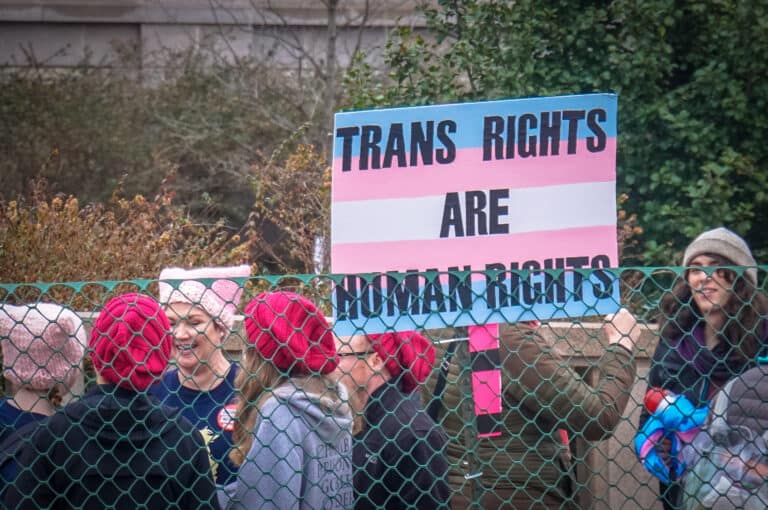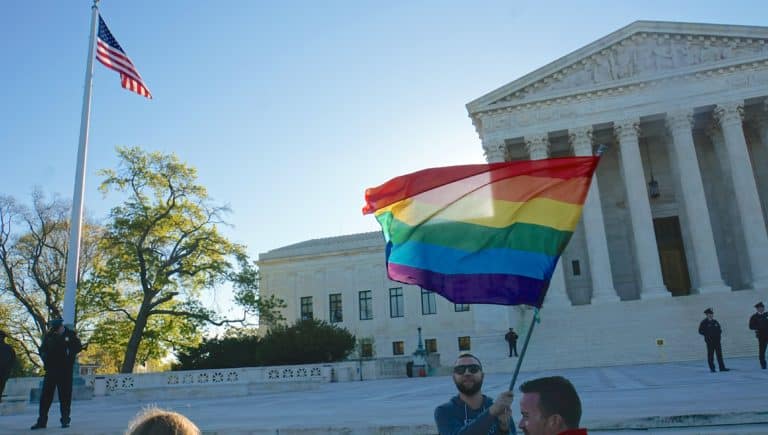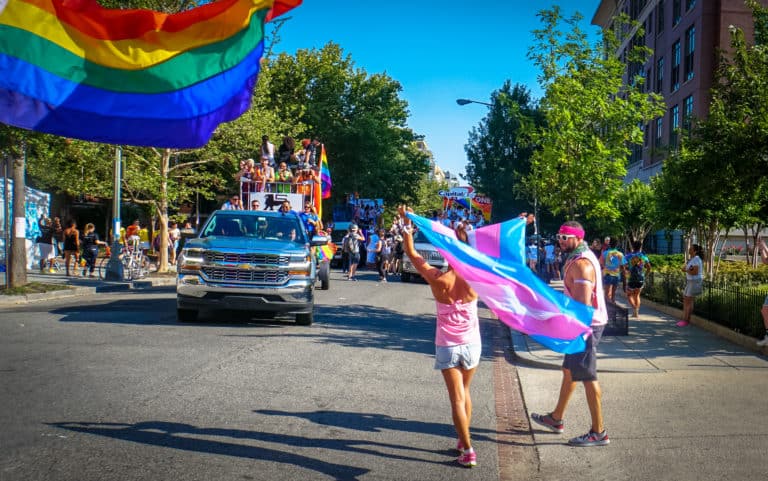Yesterday the Supreme Court granted cert in three cases that will decide whether Title VII’s bar against discrimination because of sex extends to discrimination because of sexual orientation and gender identity. Just two years ago, advocates were cheering the opportunity to argue an LGBTQ employment discrimination case before the Court with Justice Kennedy on the bench. But the reactions since yesterday are considerably more somber.
“[I]t’s hard to see this going well,” writes Jay Michaelson at The Daily Beast. “I am not optimistic,” says Georgetown Law professor Sheila Foster. “Not great news,” contends Columbia Law professor Katherine Franke. “Yikes,” tweets Mark Joseph Stern at Slate.
Nonetheless, commentators debated whether a conservative justice would vote with the four liberals to protect LGBTQ workers, and if so, who it might be. For Bloomberg, Noah Feldman predicts that the case will “come down to political preference,” but that “Chief Justice John Roberts may be due for a moderate turn – especially if he can take it on the basis of text.” Many pointed to an exchange in the oral arguments for United States v. Windsor, in which the Chief Justice asked: “If Sue loves Joe and Tom loves Joe, Sue can marry him and Tom can’t. And the difference is based upon their different sex. Why isn’t that a straightforward question of sexual discrimination?” Still, Roberts voted against finding the Defense of Marriage Act unconstitutional and never addressed the sex discrimination question in his dissent. Joshua Block at the ACLU argues that the swing vote is not Roberts but Kavanaugh, “who has a much stronger record as [a] textualist in statutory interpretation cases.” The Wall Street Journal adds that Kavanaugh’s predecessor Justice Anthony Kennedy “led a closely divided court through a series of landmark [LGBTQ] opinions” and that Kavanaugh “once clerked for Justice Kennedy, who enthusiastically promoted the younger jurist’s career.” But OnLabor contributor Charlotte Garden explains that “Kavanaugh has a pro-employer record in discrimination cases; in cases where he would have reached a different outcome than his DC Cir[cuit] colleagues, it was because he read Title VII more narrowly than they did.”
Some worry that the Court will not only deny LGBTQ workers protection under Title VII, but also roll back other extensions of sex discrimination that courts have fashioned since 1964. At Slate, Stern writes: “If the conservative majority interprets Title VII by speculating how the law was originally understood, it will clear away decades of precedent protecting not just LGBTQ people, but also women, and anyone who does not conform to an employer’s expectations of gender norms. Price Waterhouse [which extended Title VII’s bar against sex discrimination to sex stereotyping] will be gone. So will Meritor Savings Bank [which extended the bar against sex discrimination to sexual harassment]. So too will thousands of lower court[] decisions rooted in the doctrines that courts have developed to interpret the law’s sweeping yet hazy command.” Ian Millhiser at ThinkProgress reaches a similar conclusion.
Others have a rosier view. “I’m holding onto some optimism,” Sally Abrahamson, who co-chairs a plaintiff-side LGBTQ rights practice, told HuffPost. She says, “It would be ‘bananas’ for the court to hold that same-sex marriage is legal while at the same time saying it’s OK to discriminate against workers in same-sex relationships.” “It might not be bad,” says trial lawyer Max Kennerly. Kennerly finds it noteworthy that the Court granted cert in Bostock/Zarda and Harris concurrently, despite a request from Trump’s Solicitor General to deny cert in Harris, “presumably because they thought it would be bad for their anti-LGBTQ policies to have it heard at the same time.” Kennerly thinks the Solicitor General opposed the grant “for the same reason the ‘Alliance Defending Freedom’ wanted it: because it greatly expands the questions presented, taking them from ‘sexual orientation’ to ‘sex stereotyping in general.’” Kennerly believes the Court is unlikely to disturb the Court’s previous cases on sex stereotyping, especially given that “Scalia wrote, and Thomas joined, the unanimous opinion in the Oncale case, which recognized that same-sex harassment was prohibited by Title VII.”
The New York Times Editorial Board calls attention to when the decisions in the cases are likely to come down — “the summer of 2020 — that is, in the heat of the presidential campaign, when voters will be judging candidates in part on where they stand on gay and transgender rights.” Commenting to Law360, management-side attorney Jason Habinsky called the timing a “perfect storm of politics and jurisprudence.” Anthony Michael Kreis claims it “will be one of the biggest tests of whether the Court will act in countermajoritarian fashion in the Trump Era,” given that most Americans support LGBTQ anti-discrimination rights.
Some contemplated the repercussions if the Court rules against Title VII’s extension to LGBTQ workers. SEIU President Mary Kay Henry observed that if the Court rejects the employees’ claims, “in many states a union contract will be the only thing that can protect [LGBTQ workers] from getting fired simply because of who they are.” Still, many explained that an adverse decision could be remedied through federal legislation. In fact, Congress could act now to pass the Equality Act, which would explicitly add sexual orientation and gender identity to the list of protected classes in the Civil Rights Act of 1964.
But if the Court rules for LGBTQ workers, other consequences may follow. James Esseks at the ACLU says that such a decision is “not limited to the employment context.” If the Court holds that the bar against sex discrimination in Title VII encompasses discrimination based on sexual orientation and gender identity, there is “not much reason” it would reach a different conclusion with respect to education and housing. That is an effect some conservatives fear. As one attorney told Bloomberg Law, “Un-elected officials—whether bureaucrats or judges—lack the constitutional power to make these choices for us.” But LGBTQ advocates believe that Congress has already made the key decision. Congress chose to bar discrimination because of sex, and “there is no way to discriminate against LGBTQ people without taking sex into account.”










Daily News & Commentary
Start your day with our roundup of the latest labor developments. See all
July 9
In Today’s News and Commentary, the Supreme Court green-lights mass firings of federal workers, the Agricultural Secretary suggests Medicaid recipients can replace deported farm workers, and DHS ends Temporary Protected Status for Hondurans and Nicaraguans. In an 8-1 emergency docket decision released yesterday afternoon, the Supreme Court lifted an injunction by U.S. District Judge Susan […]
July 8
In today’s news and commentary, Apple wins at the Fifth Circuit against the NLRB, Florida enacts a noncompete-friendly law, and complications with the No Tax on Tips in the Big Beautiful Bill. Apple won an appeal overturning a National Labor Relations Board (NLRB) decision that the company violated labor law by coercively questioning an employee […]
July 7
LA economy deals with fallout from ICE raids; a new appeal challenges the NCAA antitrust settlement; and the EPA places dissenting employees on leave.
July 6
Municipal workers in Philadelphia continue to strike; Zohran Mamdani collects union endorsements; UFCW grocery workers in California and Colorado reach tentative agreements.
July 4
The DOL scraps a Biden-era proposed rule to end subminimum wages for disabled workers; millions will lose access to Medicaid and SNAP due to new proof of work requirements; and states step up in the noncompete policy space.
July 3
California compromises with unions on housing; 11th Circuit rules against transgender teacher; Harvard removes hundreds from grad student union.